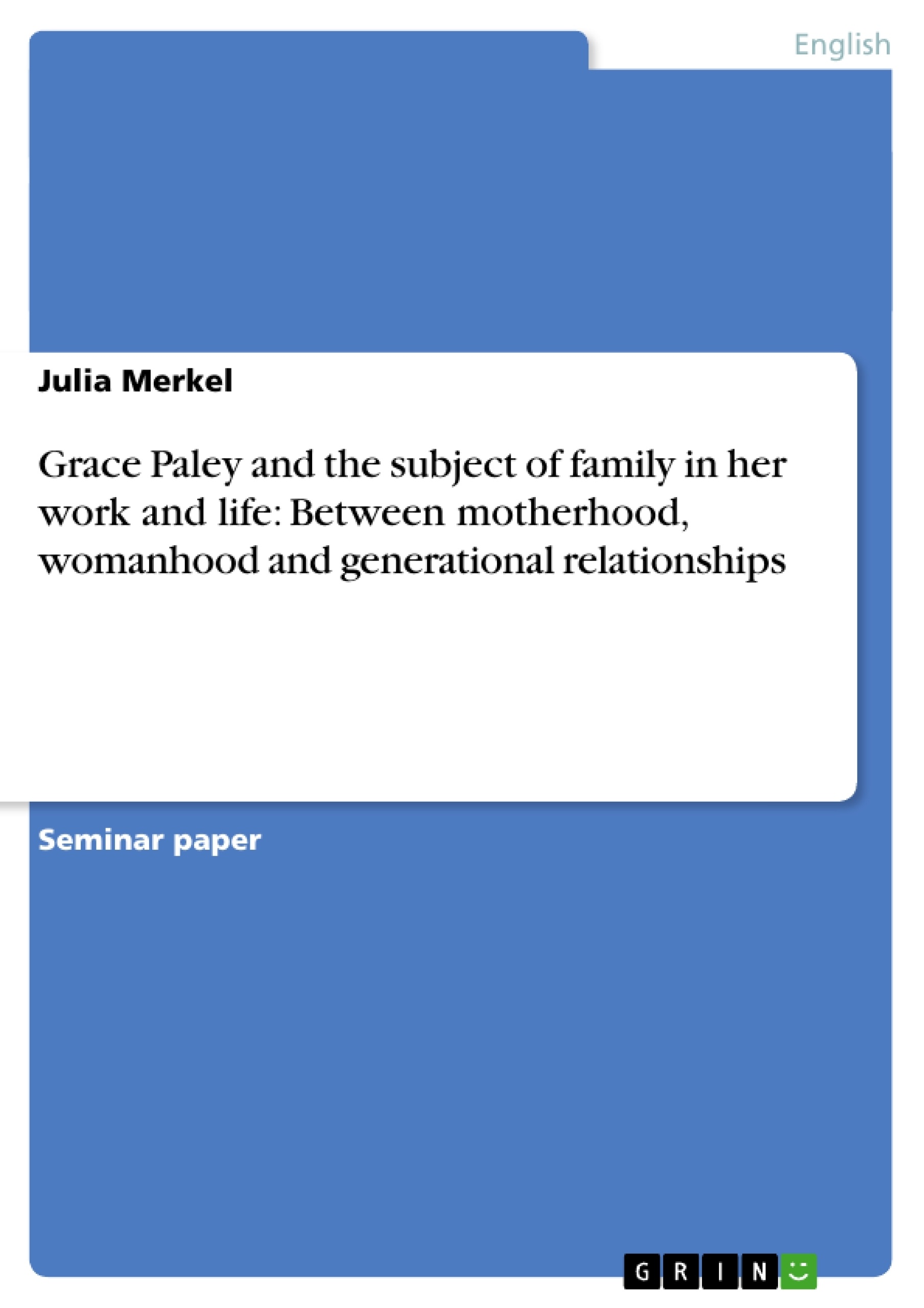Grace Paley is a well-renowned author of prose and poetry, a political activist, and a passionate mother and grandmother. She never detached her working as an author from her family life and her own family relationships, but made it a central subject of her work. Her life and work resist separation; it would only result in artificial and false distinctions. Besides political concerns and feminist issues, the family and generational relationships are the main focus in both Grace Paley’s life and work. I will analyze this in three steps: first I will examine her biography and its influence on her work. In a second step I argue that the subject of family is a central and repeating issue in Grace Paley’s work, exemplifying this on a selection of short stories and poems. In the third and final section I will show how family matters are interwoven with feminist issues.
Inhaltsverzeichnis (Table of Contents)
- Introduction: A daughter, mother, grandmother and feminist
- Grace Paley's biography and her own family
- Biography
- Influence on her work
- Subject of family in prose and lyric
- "On Mother's Day" and “Note to Grandparents”
- "Friends" and "Faith in the Afternoon"
- Feminism and family
- Political activism
- Literature
Zielsetzung und Themenschwerpunkte (Objectives and Key Themes)
This essay examines the role of family in Grace Paley's life and work. It explores how family relationships, particularly those between mothers and daughters, are central to her writing. The essay also considers the interplay between Paley's personal experiences, her political activism, and her feminist perspectives in shaping her literary output.
- The influence of Grace Paley's personal biography on her work
- The importance of family relationships and generational dynamics in Paley's writing
- The intersection of feminism and family themes in Paley's work
- The portrayal of women's experiences and perspectives in a male-dominated literary scene
- The relationship between personal experiences and literary creation
Zusammenfassung der Kapitel (Chapter Summaries)
The introduction positions Grace Paley as a significant author whose work is deeply intertwined with her personal experiences as a daughter, mother, grandmother, and feminist. It emphasizes the inseparability of Paley's life and work, highlighting her resistance to artificial distinctions between them. The essay outlines its three key sections: an examination of Paley's biography and its impact on her writing, an analysis of family themes in her short stories and poems, and a demonstration of how family matters are interwoven with feminist issues.
The first chapter focuses on Grace Paley's biography, exploring the influence of her upbringing in a large, Russian-Jewish immigrant family. It discusses the importance of family stories, multiple languages, and the socialist values instilled in her. The chapter highlights Paley's close but complex relationship with her father, as well as the lasting impact of her mother's early death. It also examines how her experience as a mother and grandmother informs her writing, particularly her interest in generational relationships and the passing-down of experiences.
The second chapter explores how family is a central theme in Paley's literary work. It examines how family relationships, particularly those between mothers and daughters, are depicted in her short stories and poems. This section will likely analyze specific works such as "On Mother's Day," “Note to Grandparents,” "Friends," and "Faith in the Afternoon," focusing on the themes of motherhood, familial connections, and generational conflict.
Schlüsselwörter (Keywords)
Key concepts explored in this essay include: Grace Paley, family, motherhood, womanhood, generational relationships, feminism, political activism, literary influence, biography, prose, poetry, short stories, "Friends," "Faith in the Afternoon," "On Mother's Day," “Note to Grandparents," and the intersection between personal experiences and literary creation.
Frequently Asked Questions
How does Grace Paley's biography influence her literary work?
Paley's upbringing in a Russian-Jewish immigrant family and her experiences as a mother and political activist are central to her stories, blending personal life with fiction.
What are the central family themes in Paley's writing?
The focus lies on motherhood, womanhood, and generational relationships, particularly the complex dynamics between parents, children, and grandparents.
How are feminism and family matters interwoven in her work?
Paley portrays women's domestic experiences not as separate from politics, but as a core part of feminist activism and social identity.
Which short stories are analyzed regarding family dynamics?
Key stories include "Friends," "Faith in the Afternoon," and "On Mother's Day," which explore connections, conflicts, and the passing-down of experiences.
What role did political activism play in Paley's life?
Grace Paley was a dedicated activist whose socialist values and commitment to social justice were inseparable from her identity as a writer and family member.
- Quote paper
- Julia Merkel (Author), 2005, Grace Paley and the subject of family in her work and life: Between motherhood, womanhood and generational relationships, Munich, GRIN Verlag, https://www.grin.com/document/50280



